 Imperial Villages Studies inCentral European HistoriesFounding Editors Thomas A. Brady and Roger Chickering Edited by David M. Luebke ( University of Oregon) Celia Applegate ( Vanderbilt University) Editorial Board Steven Beller ( Washington, D.C. ) Marc R. Forster ( Connecticut College) Atina Grossmann ( Columbia University) Peter Hayes ( Northwestern University) Susan Karant-Nunn ( University of Arizona) Mary Lindemann ( University of Miami) H.C. Erik Midelfort ( University of Virginia) David Sabean ( University of California, Los Angeles) Jonathan Sperber ( University of Missouri) Jan de Vries ( University of California, Berkeley) VOLUME 65 The titles published in this series are listed at brill.com/scehImperial VillagesCultures of Political Freedom in the German Lands c. 13001800By Beat Kmin LEIDEN | BOSTON Cover illustration: Coat of arms featuring an eagle and crenellated wall granted to the imperial village of Gochsheim in a charter of 1568.
Imperial Villages Studies inCentral European HistoriesFounding Editors Thomas A. Brady and Roger Chickering Edited by David M. Luebke ( University of Oregon) Celia Applegate ( Vanderbilt University) Editorial Board Steven Beller ( Washington, D.C. ) Marc R. Forster ( Connecticut College) Atina Grossmann ( Columbia University) Peter Hayes ( Northwestern University) Susan Karant-Nunn ( University of Arizona) Mary Lindemann ( University of Miami) H.C. Erik Midelfort ( University of Virginia) David Sabean ( University of California, Los Angeles) Jonathan Sperber ( University of Missouri) Jan de Vries ( University of California, Berkeley) VOLUME 65 The titles published in this series are listed at brill.com/scehImperial VillagesCultures of Political Freedom in the German Lands c. 13001800By Beat Kmin LEIDEN | BOSTON Cover illustration: Coat of arms featuring an eagle and crenellated wall granted to the imperial village of Gochsheim in a charter of 1568.
Gemeindearchiv, GO-ZM25002-UI/1-(021). Reproduced with kind permission of the communal archivist. Library of Congress Cataloging-in-Publication Data Names: Kmin, Beat A., author. Title: Imperial villages : cultures of political freedom in the German lands, c. 13001800 / by Beat Kmin. Description: Leiden ; Boston : Brill, [2019] | Series: Studies in Central European histories, ISSN 1547-1217 ; volume 65 | Includes bibliographical references and index.
Identifiers: LCCN 2019003839 (print) | LCCN 2019012878 (ebook) | ISBN 9789004396609 (E-book) | ISBN 9789004345065 (hardback : alk. paper) Subjects: LCSH: Holy Roman EmpireAdministrative and political divisions. | Holy Roman EmpirePolitics and government. | Central-local government relationsHoly Roman Empmire. | Decentralization in government Holy Roman Empire. | Country lifeHoly Roman Empire. | Country lifeHoly Roman Empire.
Classification: LCC JN3249 (ebook) | LCC JN3249 .K95 2019 (print) | DDC 320.80943dc23 LC record available at https://lccn.loc.gov/2019003839 Typeface for the Latin, Greek, and Cyrillic scripts: Brill. See and download: brill.com/brill-typeface. ISSN 1547-1217 ISBN 978-90-04-34506-5 (hardback) ISBN 978-90-04-39660-9 (e-book) Copyright 2019 by Koninklijke Brill NV, Leiden, The Netherlands. Koninklijke Brill NV incorporates the imprints Brill, Brill Hes & De Graaf, Brill Nijhoff, Brill Rodopi, Brill Sense, Hotei Publishing, mentis Verlag, Verlag Ferdinand Schningh and Wilhelm Fink Verlag. All rights reserved. No part of this publication may be reproduced, translated, stored in a retrieval system, or transmitted in any form or by any means, electronic, mechanical, photocopying, recording or otherwise, without prior written permission from the publisher.
Authorization to photocopy items for internal or personal use is granted by Koninklijke Brill NV provided that the appropriate fees are paid directly to The Copyright Clearance Center, 222 Rosewood Drive, Suite 910, Danvers, MA 01923, USA. Fees are subject to change. This book is printed on acid-free paper and produced in a sustainable manner. Dedicated to the Memory ofPeter BlickleContentsPrefaceix Notes on the Textx List of Figures and Acknowledgementsxi AbbreviationsxV Part 1Approaches1 Polities without a Prince: an Introduction3 2 Origins, Evolutions and Settings17 Part 2Regimes3 Domestic Affairs: Co-Operation and Conflict49 4 External Relations: Protectors and Predators83 5 Religious Life: Heaven and Earth119 Part 3Perspectives6 Representations and Perceptions157 7 Conclusions199 Appendix 1: Communities Possessing, Claiming or Attributed ImperialVillage Status (Pre-1803)209 Appendix 2: Senior Officials and Clergymen in Five Imperial Villagesc.13001800223 Bibliography237 Index266 Preface Looking for micro-laboratories of popular political and religious agency in pre modern Europe, the parish republic of Gersau on Lake Lucerne soon emerged as an ideal starting-point. Archival work on its records was facilitated by a Small Research Grant from the British Academy (201113). A Senior Fellowship at the Alfried Krupp Wissenschaftskolleg in Greifswald (201213) then allowed a broadening of horizons to free villages throughout the Holy Roman Empire, while an invitation to serve as Guest Professor at the University of Konstanz in 2015 provided a congenial environment for conceptual reflection, a pro cess also greatly advanced by the participants in two dedicated workshops at Gersau (in 2012 and 2014) as well as the audiences of conference/seminar pre sentations at Aberdeen, Bielefeld, Gttingen, Greifswald, Konstanz, London, Los Angeles, Manchester, Odense, Oxford, Tbingen, Vxj and Vienna.
I am indebted to all funding bodies, academic hosts, the University of Warwick (for a period of study leave to complete the typescript) and the copy right holders (for granting permission to reproduce items from their holdings in this book). Particular thanks go to the District Council of Gersau (headed by Bezirksammann Adrian Nigg-Arnold) for its enthusiastic backing of numerous project-related initiatives especially the year-long commemorative celebrations of Gersau 18142014 and several exceptionally helpful archi vists: Marzell Camenzind (Gersau), Dr Roman Fischer/Corinna Herrmann (Frankfurt), Dr Elmar Geus/Walfried Hein (Gochsheim), Marc Nrdinger (Bad Soden am Taunus) as well as the staff at the state archives of Lucerne, Schwyz, Wiesbaden, Wrzburg and the research libraries of Greifswald, Konstanz and Oxford. Alongside, I would like to acknowledge the help of Michael Geisler (Schwalbach), Albert Mller (Zug) and Klaus Belzer/Joachim Siebenhaar (Geschichtsverein Reichsdorf Sulzbach) at various points during my research. Lukas Kmin ably assisted with the indexing. Finally, I am grateful to the co editors of Studies in Central European Histories for accepting the proposal and Wendel Scholma / Kim Fiona Plas at Brill Publishers for seeing it through to publication. Notes on the Text Unless otherwise stated, dates are given in the New Style. Notes on the Text Unless otherwise stated, dates are given in the New Style.
First and place names appear (as far as possible) in Anglicized versions with standardized spelling. German quotes from primary and secondary sources have been translated into modern English by the author. All world wide web addresses were last accessed on 30 January 2019. Figures and Acknowledgements Unless otherwise stated, photographs have been taken by the author. Map of the Schweinfurt region from Johann Kaspar Bundschuh, Beschreibung der Reichsstadt Schweinfurt. Ulm: Stettische Buchhandlung, 1802, appendix.
Reproduced with kind permission from www. schweinfurtfuehrer.de7 Location of case studies within the wider topography of rural autonomy in the Holy Roman Empire, superimposed on a public domain map of early modern Central Europe from the Historical Atlas by William R. Shepherd at the Perry-Castaeda Library Map Collection, University of Texas20 Emperor conveying a charter; woodcut in Ulrich Tengler, Layen Spiegel,Von rechtmssigen ordnungen in Burgerlichen vnd peinlichen regimenten. Augsburg, 1509, J iii, f. 73r, taken from the VD16 digital library of the Bayerische Staatsbibliothek, http://daten.digitale-sammlungen.de/ bsb00002001/image_151, available under Creative Commons24 Depiction of an avoyer and juror in Reinhard Wegelin, Grndlich-Historischer Bericht von der kayserlichen und Reichs Landvogtey in Schwaben
Next page

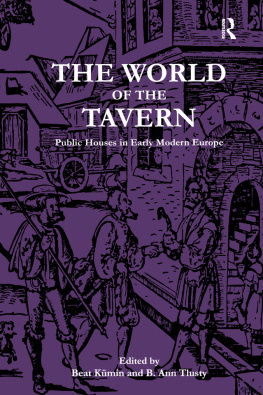
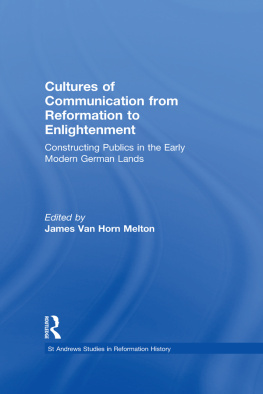
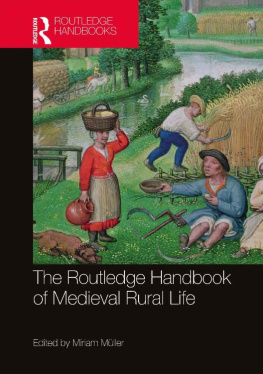
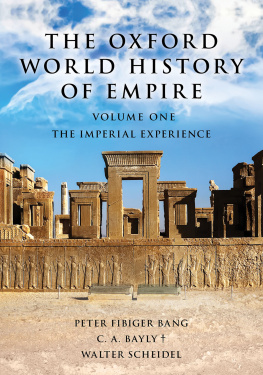
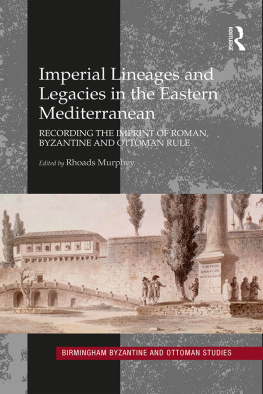
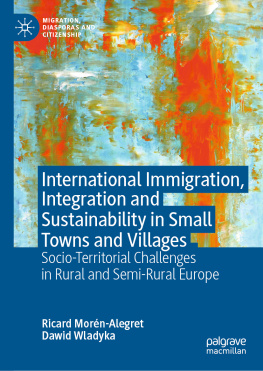
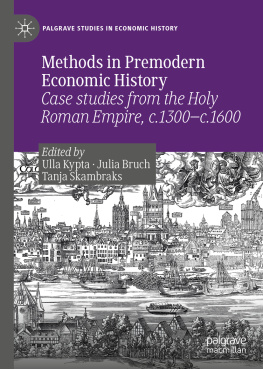
 Imperial Villages Studies inCentral European HistoriesFounding Editors Thomas A. Brady and Roger Chickering Edited by David M. Luebke ( University of Oregon) Celia Applegate ( Vanderbilt University) Editorial Board Steven Beller ( Washington, D.C. ) Marc R. Forster ( Connecticut College) Atina Grossmann ( Columbia University) Peter Hayes ( Northwestern University) Susan Karant-Nunn ( University of Arizona) Mary Lindemann ( University of Miami) H.C. Erik Midelfort ( University of Virginia) David Sabean ( University of California, Los Angeles) Jonathan Sperber ( University of Missouri) Jan de Vries ( University of California, Berkeley) VOLUME 65 The titles published in this series are listed at brill.com/scehImperial VillagesCultures of Political Freedom in the German Lands c. 13001800By Beat Kmin LEIDEN | BOSTON Cover illustration: Coat of arms featuring an eagle and crenellated wall granted to the imperial village of Gochsheim in a charter of 1568.
Imperial Villages Studies inCentral European HistoriesFounding Editors Thomas A. Brady and Roger Chickering Edited by David M. Luebke ( University of Oregon) Celia Applegate ( Vanderbilt University) Editorial Board Steven Beller ( Washington, D.C. ) Marc R. Forster ( Connecticut College) Atina Grossmann ( Columbia University) Peter Hayes ( Northwestern University) Susan Karant-Nunn ( University of Arizona) Mary Lindemann ( University of Miami) H.C. Erik Midelfort ( University of Virginia) David Sabean ( University of California, Los Angeles) Jonathan Sperber ( University of Missouri) Jan de Vries ( University of California, Berkeley) VOLUME 65 The titles published in this series are listed at brill.com/scehImperial VillagesCultures of Political Freedom in the German Lands c. 13001800By Beat Kmin LEIDEN | BOSTON Cover illustration: Coat of arms featuring an eagle and crenellated wall granted to the imperial village of Gochsheim in a charter of 1568.